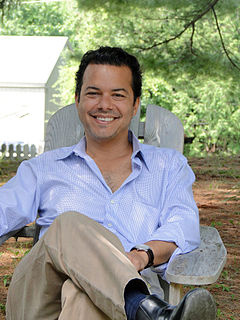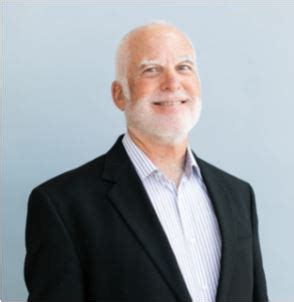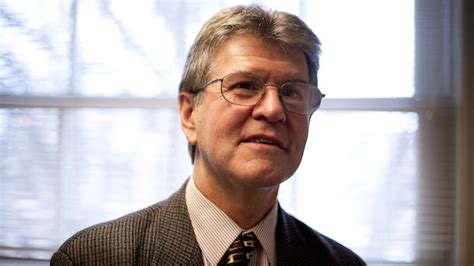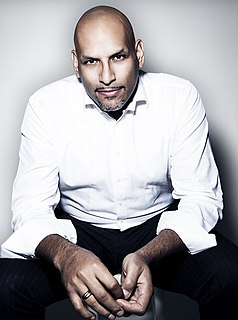Top 1200 Religious Leaders Quotes & Sayings - Page 15
Explore popular Religious Leaders quotes.
Last updated on November 18, 2024.
The unwillingness of most leaders to set standards, to administer feedback when standards are not met, to praise clearly when standards are met, stands in the way of the development of excellence. The leader who makes no demands of his disciples cannot really lead them at all. The sense of new excitement and new challenge generated by the gospel will be blunted by leaders who shield followers from the full demands of fellowship.
You ought not to accept the claim that this is a religious practice. I think that's, frankly, problematic for Islam, for well-intentioned Liberals like you to say that this is a religious practice when the overwhelming consensus of Islamic scholars around the world, and the overwhelming majority of Canadian Muslims, believe this has absolutely - that the niqab as face covering, that this symbol of misogyny has nothing to do with Islam.
Christianity does not claim to convey merely religious truth, but truth about all reality. This vision of reality is radically different from a secularist vision that wants Christianity to scuttle into the corner of the hearth by the coal shovel, conveniently out of the way of anything but private religious concerns
If you are posing as religious and are not living the life as stressed by God, you should wake up. It is wrong to be insincere. The best time to begin a religious life is when you are youthful and well. If you have a short time to live, you must work harder at it. And if you have along time to live, you should not waste that precious opportunity.
The biggest problem I have with the stupidity of our foreign policy, we have Mosul. They think a lot of the ISIS leaders are in Mosul. So we have announcements coming out of Washington and coming out of Iraq, we will be attacking Mosul in three weeks or four weeks. Well, all of these bad leaders from ISIS are leaving Mosul. Why can't they do it quietly?
So the best marriages and the deepest relationships with God grow out of the startling discovery that there is nothing one can do to earn love, and even more startling, that there is also nothing one can do to unlearn it, or to keep oneself from being loved. This is a religious awakening that is utterly different from any other religious experience, no matter how profoundly spiritual it may seem.
Over the years, black leaders have been slow to recognize the need for a very, very progressive agenda. Anytime someone has talked about putting America back to work, blacks should have said yes, but they didn't. They were so preoccupied with affirmative action that they didn't provide the kind of leadership that would help some of the other progressive folks. Only now are black leaders beginning to realize the impact of economic issues.
Some good leaders are rough around the edges and some leaders are difficult. Some have difficult personalities and some are really nice to be around, but those are not the qualifications. The qualifications are their desire to see us achieve more, their desire to push us to be the best we can be. Not for their selfish gain, but because they believe that we have something to offer.
It seems to me there is less meanness in atheism, by a good measure. It seems that the spirit of religious self-righteousness this article deplores is precisely the spirit in which it is written. Of course he's right about many things, one of them being the destructive potency of religious self-righteousness. (p. 146)
Religion and race belong together. German man can only assimilate religious faith and religious thought with a German mind and in a German way. We must not think we can come to God except through our Volk....Wherever our blood rises in protest we act immorally, even though others may try to prove it to be moral.
No one can write their real religious life with pen or pencil. It is written only in actions, and its seal is our character, not our orthodoxy. Whether we, our neighbor, or God is the judge, absolutely the only value of our religious life to ourselves or to anyone is what it fits us for and enables us to do.
The great religious ages were notable for their indifference to human rights... not only for acquiescence in poverty, inequality, exploitation and oppression, but also for enthusiastic justifications for slavery, persecution, abandonment of small children, torture, and genocide... Moreover, religion enshrined hierarchy, authority, and inequality... It was the age of equality that brought about the disappearance of such religious appurtenances as the auto-da-fe and burning at the stake.
Monotheistic religions alone furnish the spectacle of religious wars, religious persecutions, heretical tribunals, that breaking of idols and destruction of images of the gods, that razing of Indian temples and Egyptian colossi, which had looked on the sun 3,000 years: just because a jealous god had said, Thou shalt make no graven image.
Right now, culturally, we're seeing a really interesting evolution in ideas about spirituality and the world, right? The number of people who consider themselves to be religious and going to services is dropping, and the number of people who consider themselves to be spiritual but not religious is increasing.
Religion is not a matter of God, church, holy cause, etc. These are but accessories. The source of religious preoccupation is in the self, or rather the rejection of the self. Dedication in the obverse side of self-rejection. Man alone is a religious animal because, as Montaigne points out, it is a malady confined to man, and not seen in any other creature, to hate and despise ourselves.
Barack Obama is the President of the United States, a politician in America, a very religious country, so I understand why he has to pretend to be a religious person himself. I say pretend because, I can only hope that someone as bright as he, wouldn't really believe that people can walk on water and ride a winged horse and rain frogs and you can change water into wine.
As a result of changes which, over the last century, have modified our empirically based pictures of the world and hence the moral value of many of its elements, the "human religious ideal" inclines to stress certain tendencies and to express itself in terms which seem, at first sight, no longer to coincide with the "christian religious ideal".
I admire leaders in science, people who really figure things out like Richard Fineman or people who work on vaccines, tons of people working on [the] HIV vaccine. There's leaders in business, people like Warren Buffett, who've got a certain approach they take that are pretty amazing. There [are] product innovators like Steve Jobs was, where he gets behind a concept and does a fantastic job.
There is not a truth to be gathered from history more certain, or more momentous, than this: that civil liberty cannot long be separated from religious liberty without danger, and ultimately without destruction to both. Wherever religious liberty exists, it will, first or last, bring in and establish political liberty.
Sometimes I feel that in religious content, religious drama, it's almost told like a tale, like an account of facts, and in 'A.D. The Bible Continues,' it's drama, it's real drama that we like to see on TV today, seeing the characters struggle and doubt and be completely in conflict with each other, kind of like 'House of Cards.'
Every human being shall see in each and all of his fellow-men a hidden divinity... that every human being is made in the likeness of the Godhead. When that time comes there will be no need for any religious coercion; for then every meeting between one man and another will of itself be in the nature of a religious rite, a sacrament.
Leaders should get out of their comfort zone but stay in their strength zone. When their work lies within their natural gifting and strengths, leaders experience the greatest return in productivity and contentment. Life is too short to live in the comfort zone, where growing and accomplishing and achieving your potential takes a back seat. I suggest you refocus if the comfort zone is your leadership priority.
Where it is the majority religion, Islam does not recognize religious freedom, at least not as we understand it. Islam is a different culture. This doesn't mean that it's an inferior culture, but it is a culture that has yet to connect with the positive sides of our modern Western culture: religious freedom, human rights and equal rights for women.
Much of the point of individual action is really to communicate with other people and with political leaders and to demonstrate to them that we are willing to live lives which are less dependent on fossil fuels and we'll show you that now by changing our individual life to some extent but we want you to take action, political leaders, so that we aren't living in a society in which we're dependent on poisoning the future in order to maintain present lifestyles.
If all the evidence put forward for the authenticity of religious teachings originates in the past, it is natural to look round and see whether the present, about which it is easier to form judgements, may not also be able to furnish evidence of the sort. If by this means we could succeed in clearing even a single portion of the religious system from doubt, the whole of it would gain enormously in credibility.
As I travel around the world, it's fascinating; European leaders, Asian leaders, they all say to me, America is actually poised to be the world leader for another century - if we can fix some of this political dysfunction. ... We've got a lot of national security challenges, but if we get our economy together, and if we can get our political system to work well, I am really confident about our future.
I think one of the greatest losses to humanity was the domination of women. I think every religious system has found ways to be kind to them in a kind of subordinate way. Very patronizing, very colonial. But if you start looking at the fabric of society, even religious systems, they would fall apart if it wasn't for the embedded ability of the women who are involved.
The underlying foundation of all religion is performance - whether it's a tribal dance around a campfire to satisfy the fire god, or a dead religious activity performed week after week by an evangelical Christian with the intent of impressing his God. It's all religious performance, and God isn't impressed by our performance. What impresses Him is faith.
We know that the African regimes, many African regimes have failed their people and many Africans want regime change, and there are a lot of African leaders who make promises but don't carry them out. I mean, the progress - I mean, it is noble for the rich countries to help Africa, but then the question is: What are African leaders themselves doing to help their own people?
Recently, there has been a profound change in how we think about corporate leadership. The 1990s was the era of celebrity leaders: we focused on Jack Welch, and not GE, on Bill Gates, and not Microsoft, on Steve Jobs, and not Apple, on Larry Ellison and not Oracle. But, on reflection, the records of most high-profile leaders have not withstood closer scrutiny. In almost all cases, it turns out that the success of organizations is due to the collective efforts of many, and not to the genius of a single, all-powerful individual at the top.
. If you believe that your nation is divinely ordained to rule Europe, and you must struggle to establish its supremacy, is that a religious doctrine or a nationalist one? In Germany especially, the whole super-nationalist ideology of the post-1871 empire is heavily imbued with religious teaching, chiefly Lutheran, and frankly viewing the new empire as the germ of the kingdom of God on Earth.
You have to be closer to religious origins -- the generation of the 20's was truly secular in that it still knew its theology and its varieties of religious experience. We are post-secular, inventing new faiths, without any sense of organizing truths. The truths we accept are so multiple that honesty becomes little more than a strategy by which you manage your tendencies toward duplicity.
In the face of ambiguity, uncertainty, and conflicting demands, often under great time pressure, leaders must make decisions and take effective actions to assure the survival and success of their organizations. This is how leaders add value to their organizations. They lead them to success by exercising good judgment, by making smart calls when especially difficult and complicated decisions simply must be made, and then ensuring that they are well executed.
The anything-goes passiveness of the religious and political Left is matched by the preachy moralism of the religious and political Right. The person who uncritically embraces any party line is guilty of an idolatrous surrender of her core identity as Abba's Child. Neither liberal fairy dust nor conservative hardball addresses our ragged human dignity.
When there is pressure for leaders to respond to problems or crises, they often simply intensify their efforts in their particular defined sphere of activity - even if that's not relevant to the real problem. To do otherwise requires taking on entrenched practices and asserting power in areas where it often will not be well received. And leaders tend to see major crises more as threats to their own position rather than as systemic challenges for the societies that they govern or the institutions that they manage.
Who does not see that we are likely to ascertain the distinctive significance of religious melancholy and happiness, or of religious trances, far better by comparing them as conscientiously as we can with other varieties of melancholy, happiness, and trance, than by refusing to consider their place in any more general series, and treating them as if they were outside of nature's order altogether?
I've known a lot of very religious people. My mother is very religious, but she was also very - is very private about it. She - when I was growing up, she never went to church. She just prayed and read her Bible and kept it to herself. So I'm not from a background of flamboyant believers. It's much more a personal issue.
Let us labor for the security of free thought, free speech, pure morals, unfettered religious sentiments, and equal rights and privileges for all men, irrespective of nationality, color, or religion;.... leave the matter of religious teaching to the family altar, the church, and the private school, supported entirely by private contribution. Keep church and state forever separate.
I was a young woman who had grown up in the mountains of Montana as a Protestant Methodist in a pretty good social gospel tradition. I became fascinated with the religious lives of others who seemed also to be very religious, yet in ways that were quite different from my own. That fascination led to relationships, in India and elsewhere, with families of Hindus, of Muslims, of Sikhs, and a lot of study.
The Republican Party has pretty much abandoned any pretense of being a traditional political party. It's in lockstep obedience to the very rich, the super rich and the corporate sector. They can't get votes that way so they have to mobilize a different constituency. It's always been there, but it's rarely been mobilized politically. They call it the religious right, but basically it's the extreme religious population.
Because the bill in reserving a certain parcel of land in the United States for the use of said Baptist Church comprises a principle and a precedent for the appropriation of funds of the United States for the use and support of religious societies, contrary to the article of the Constitution which declares that "Congress shall make no law respecting a religious establishment."
The idea, therefore, that religious faith is somehow a sacred human convention—distinguished, as it is, both by the extravagance of its claims and by the paucity of its evidence—is really too great a monstrosity to be appreciated in all its glory. Religious faith represents so uncompromising a misuse of the power of our minds that it forms a kind of perverse, cultural singularity—a vanishing point beyond which rational discourse proves impossible.






















































